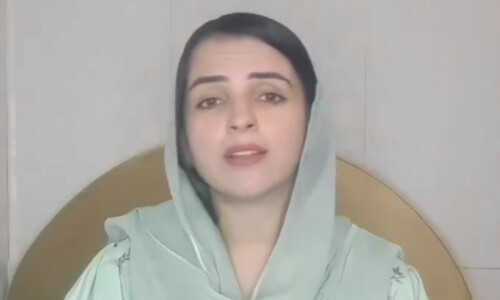• Experts propose network of ‘sewer tunnels’ under roads in high-flood zones
• President calls for taking urgent steps to address Hyderabad’s flooding and sewage issues
ISLAMABAD: President Asif Ali Zardari on Monday directed the Sindh government to devise a comprehensive plan to prevent urban flooding in Karachi by adopting a sustainable and long-term strategy based on the best international practices for sewage and storm water management.
He expressed these views while chairing a high-level meeting at Aiwan-i-Sadr in the capital on saving Karachi from urban flooding and environmental degradation, and for promoting sustainable water resource development.
Sindh Chief Minister Syed Murad Ali Shah, Local Government Minister Saeed Ghani, Karachi Mayor Barrister Murtaza Wahab, Sindh Chief Secretary Syed Asif Hyder Shah, Karachi Water and Sewerage Corporation Chief Executive Officer Syed Salahuddin had specially flown to Islamabad to attend the meeting.
Other participants include Adjutant General Lieutenant General Muhammad Asim Malik, senior government officials, local and international water management experts.
The president was given a comprehensive presentation by the experts who proposed various solutions to address the challenges of urban flooding and sewage in Karachi on the pattern of the tunnel sewer systems of Washington, super sewer project of London and deep tunnel sewerage system of Singapore.
During the briefing, it was proposed that a network of small and large sewer tunnels under existing roads in high-flood zones of Karachi might be developed.
It was highlighted that underground tunnelling using modern techniques would not disturb the public, city traffic and land ownership.
The experts informed that Karachi generated almost 450 million gallons per day (MGD) of sewage. They said that sewage and storm water were collected in small and large open drains which fell into the Lyari and Malir rivers and were released untreated into the sea, polluting the marine ecosystem.
The meeting was apprised of the limitation of the existing network of drains which absorbed around 50 per cent of the rainwater under normal circumstances. However, the excess water that was not absorbed by the system caused urban flooding, the experts said.
Speaking on the occasion, President Zardari underlined the need for completing a feasibility study to control flooding in Karachi through tunnelling options within three months.
He said Karachi and its coastal areas needed to be made clean and brought on a par with other metropolitan cities of the world.
The president said that keeping in view of significant environmental impacts, the government of Sindh should approach international donors to seek environmental financing for the project.
He said the construction of the wastewater treatment system would also help supply treated water to Balochistan for agriculture, besides promoting the fisheries sector.
The president remarked that the city of Hyderabad was also facing urban flooding and sewage issues that also needed to be addressed on a priority basis.
Published in Dawn, July 23rd, 2024
















































Dear visitor, the comments section is undergoing an overhaul and will return soon.